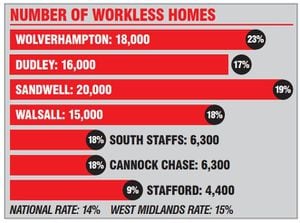Revealed: More than 80,000 homes where no-one works
More than 80,000 households across the Black Country and Staffordshire have no-one working, according to official figures.

Some 19 per cent of households in the Black Country were workless last year, above the national average of 14 per cent.
The Office for National Statistics classes households as workless if no-one aged 16 and over living there is employed.
While figures were not broken down locally, the most common reason people gave for not being in employment across the West Midlands was sickness or disability – cited by 32 per cent of those out of work.
Early retirees made up 16 per cent of jobless people, and students 12 per cent.
Only 13 per cent of the group were officially unemployed, or looking for work and able to start within two weeks.

The highest proportion of jobless households in the region is in Wolverhampton – around 18,000 or 23 per cent.
In Dudley it is 16,000 (17 per cent), Sandwell 20,000 (19 per cent) and Walsall 15,000 (18 per cent).
There are fewer workless homes in Staffordshire. The figures showed there were 3,300 (11 per cent) in South Staffordshire, 6,300 (18 per cent) in Cannock Chase and 4,400 (nine per cent) in Stafford.
According to the Department for Work and Pensions, the number of workless households has fallen in all parts of the UK since 2010, with more than a million households with at least one adult in work.
A spokeswoman said: “We are committed to ensuring this trend continues by supporting people, especially parents, into work by providing personalised support through our job centres and under the new benefits system parents can claim up to 85 per cent of childcare costs.”
But this has masked an “explosion” of insecure work pushing people into the red, said Trades Union Congress general secretary Frances O’Grady.
She said: “Any drop in unemployment is good, but it’s not right that millions of hard-working people across Britain are struggling to make ends meet.
"And if the Government presses ahead it with its threat of a no-deal Brexit this will only get worse.”
Unions were key to negotiating better conditions and pay in the workplace, Ms O’Grady added. Mike Hawking, policy and partnerships manager at the Joseph Rowntree Foundation, cautioned that more working families were “trapped in poverty”.





